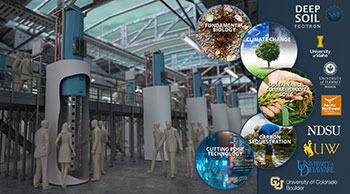UW Part of Consortium Developing Worlds First Deep Soil Ecotron Facility
Published September 29, 2021

The University of Wyoming is part of a consortium of universities and research institutions that will build and operate an experimental research facility to study soil at depths greater than at any other soil research facility in the world, with support from an $18.9 million National Science Foundation (NSF) grant.
While housed at the University of Idaho, the Deep Soil Ecotron will enable scientists at UW and other institutions to conduct experiments on columns of soil up to 3 meters deep (about 10 feet). Currently, to study soils, scientists often dig pits, which destroys the soil systems as they are uncovered. Also, most research involves just the top 30 centimeters (roughly one foot) of soil.
“This facility and project will place the University of Wyoming at the center of cutting-edge new advances in ecological and agricultural research, and provide a platform for UW researchers and students to investigate some of our nation’s most pressing environmental challenges related to soil health and sustainability,” says UW Professor Dave Williams, director of UW’s Stable Isotope Facility, who will direct UW’s participation in the project. “We will develop approaches for understanding how deep-soil processes interact with surface soils and plant root systems, and how deep soils respond to global changes, such as climate warming, rising atmospheric carbon dioxide concentrations and changing water availability.”
Along with UW and the University of Idaho, the facility will be led by scientists from the University of Colorado, the University of Delaware, the University of Hawaii, North Dakota State University and Pacific Northwest National Laboratory. The leadership team will design and develop the new facility and its capabilities for exploration of deep-soil organisms, soil nutrient cycling, carbon sequestration and responses to environmental change.
“Deep soils are probably one of the last research frontiers,” says Michael Strickland, a University of Idaho associate professor who is the project’s lead principal investigator. “Soils are inherently important to life on the planet, from supporting plants to driving processes like carbon and nutrient cycling, but a lot of research has been focused on the surface. This facility would enable us to better understand those processes at depth.”
When complete, the Deep Soil Ecotron will contain as many as 24 “eco-units,” essentially huge columns used to study soil cores complete with above-ground plants and below-ground organisms, such as insects and microbes. Researchers will be able to control a range of variables including temperature, water and exposure to carbon dioxide and other greenhouse gases. The Ecotron will be housed at the University of Idaho’s JW Martin Laboratory, with renovation expected to start in spring 2022.
A central goal for Williams and his UW lab group will be to develop new capabilities for investigating elemental cycling and water flows in deep soils using advanced isotope measurement systems, leveraging UW’s state-of-the-art Stable Isotope Facility. Williams, a professor in the Department of Botany and the Department of Ecosystem Science and Management, also will co-lead with the University of Idaho’s Zack Kayler the development of a researcher user base for the new facility involving scientists from across NSF EPSCoR jurisdictions. EPSCoR is the Established Program to Stimulate Competitive Research, focused on enhancing research competitiveness of targeted states and territories by strengthening capacity and capability in science, technology, engineering and mathematics.
“We will use this opportunity to train the next generation of environmental scientists to work collaboratively on large-scale research projects involving cutting-edge measurement technologies and cyberinfrastructure, and develop and manage large, national-scale scientific facilities,” Williams says.
Only 13 facilities of this type exist in the world, with most located in Europe. None go to the soil depths planned at the Deep Soil Ecotron, which will give scientists greater ability to monitor and manipulate the eco-units for controlled experiments.
“This facility will represent a huge leap forward in our understanding of soil and terrestrial ecosystems -- on the level of space and deep ocean exploration after similar investments,” says Kayler, an assistant professor of biogeochemistry at the University of Idaho. “We're facing times of uncertainty. We don’t know where the climate trends are going and can’t prepare using past knowledge. This facility will allow us to perform experiments that will help us plan for those future environmental conditions.”
Studies conducted at the Ecotron will improve understanding of how deep soil organisms react to unprecedented conditions, how soil systems respond to agricultural practices and how well they sequester carbon.

